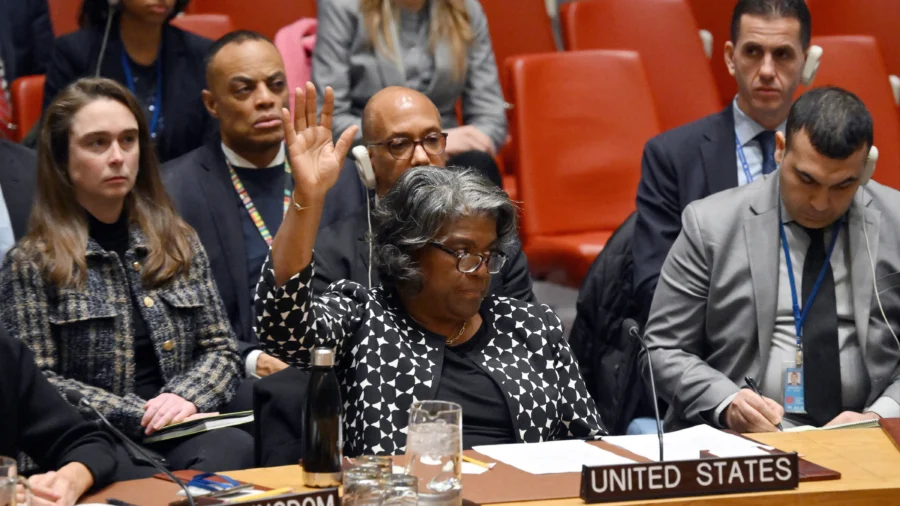The United States exercised its permanent veto on Feb. 20 over a U.N. Security Council resolution calling for a permanent ceasefire between Israel and the terrorist group Hamas.
The resolution was introduced by Algeria, which has no formal diplomatic ties with Israel.
“Our message for you today is that the international community should respond to the calls for ending the killing of Palestinians by calling for an immediate ceasefire,” Algerian Ambassador Amar Bendjama told the Security Council following the failed vote.
The United Kingdom, which also has a permanent veto, abstained while 13 members voted in favor of it. While the Security Council requires nine votes to pass a resolution, the U.S. veto automatically overrules the majority. In addition to the United States and the United Kingdom, China and Russia have a permanent veto on the Security Council.
Meanwhile, the United States introduced an alternative Security Council resolution calling for a temporary ceasefire. Whether there will be a vote on it is to be determined.
The U.S. draft also calls for Israel not to launch a military operation into the Gazan city of Rafah, which borders Egypt, as doing so “would result in further harm to civilians and their further displacement including potentially into neighboring countries.”
“For weeks, we have made it incredibly clear that the resolution before the council would not achieve the goal of a sustainable peace and may in fact run counter to it,” U.S. Ambassador to the U.N. Linda Thomas-Greenfield told the Security Council.
“Proceeding with a vote today was wishful and irresponsible,” she continued.
“And so while we cannot support a resolution that would put sensitive negotiations in jeopardy, we look forward to engaging on a text that we believe will address so many of the concerns we all share, a text that can and should be adopted by the council so that we can have a temporary ceasefire as soon as practical, based on the formula of all hostages being released.”
Nonetheless, said Ms. Thomas-Greenfield, a temporary ceasefire would be “critical to getting aid into the hands of Palestinian civilians who desperately, desperately need it.”
The Biden administration has resisted calls from progressives to call for a ceasefire between Hamas and Israel, which launched a military operation in Gaza, which Hamas controls, in response to Hamas terrorists infiltrating the Jewish state on Oct. 7. The Hamas terrorists murdered, raped, and maimed Israelis and took others hostage into Gaza. It was the single largest massacre of Jews in a day since the Holocaust.
Following the vote, Israeli Ambassador Gilad Erdan called any ceasefire a “silver bullet” for Hamas.
“A ceasefire is the epitome of a kick the can down the road” that would allow Hamas to gain ammunition and attack Israel again, he said.
Mr. Erdan lamented and noted that the Security Council has not condemned Hamas even once since Oct. 7.
“Condemn Hamas as a Council; do it for the sake of the hostages,” he said.
Meanwhile, Qatar’s ambassador to the United Nations, Alya Ahmed Saif Al-Thani, said that on behalf of the Gulf Cooperation Council—which includes Saudi Arabia, the United Arab Emirates, Oman, Qatar, Kuwait, and Bahrain—the United Nations should condemn Israel’s planned military operation in Rafah.
“We are living the worst humanitarian disaster the world has ever seen,” said Ms. Al-Thani.
“We also condemn the forced displacement of civilians and regret the suspension of the financing of UNRWA,” she said.
The United States halted funding to the UNRWA, the U.N. agency that deals with Palestinian refugees, over UNRWA personnel allegedly taking part in the Oct. 7 attack. In response, UNRWA has fired staff members allegedly involved in the massacre and is undertaking an investigation into the allegations by Israel over staffers joining Hamas during the assault.
Qatar supported the resolution calling for a permanent ceasefire.
From The Epoch Times

